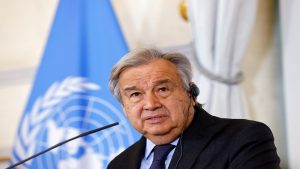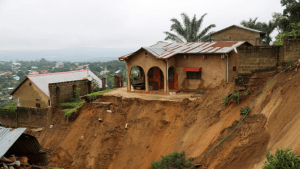The latest state of the Climate Report from the World Meteorological Organisation is a depressing litany of humanity’s failure to address climate disruption. This statement was made by Antonio Guterres at the launch of the 2021 report, which points to new records in greenhouse gas concentrations, sea-level rise, ocean heat, and ocean acidification.
These indicators point to human activities as the cause of planetary changes with harmful and long-lasting ramifications for sustainable development and ecosystems. The report says extreme weather has led to hundreds of billions of dollars in economic losses, often with a heavy toll on human lives and well-being.
The images of extreme rainfall in South Africa’s KwaZulu Natal province that claimed more than 430 lives causing billions of Rands in damage – are still fresh. And while no one event can definitively be blamed on climate change, the mounting evidence globally is pointing in one direction.
UN Secretary General Antonio Guterres says, “I will give you the bottom line. The global energy system is broken and bringing us ever closer to climate catastrophe. Fossil fuels are a dead end – environmentally and economically. The war in Ukraine and its immediate effects on energy prices is yet another wake-up call. The only sustainable future is a renewable one. We must end fossil fuel pollution and accelerate the renewable energy transition before we incinerate our only home. Time is running out.”
World Meteorological Organisation’s report shows new records in greenhouse gas:
He called for Five Critical Actions – starting with renewable energy technologies that must be treated as essential global public goods calling for a global coalition on battery storage to fast track innovation and deployment; To secure, scale-up and diversify the supply of critical components and raw materials for renewable energy technologies; For Governments to build frameworks and reform bureaucracies to a level playing field for renewables; he urged Governments to shift subsidies away from fossil fuels while calling for private and public investments in renewable energy to triple to at least 4 trillion dollars annually.
“In many countries, these systems still favour deadly fossil fuels. We must prevent bottlenecks, where gigawatts of renewable projects are held up by red tape, permits and grid connections. I call on governments to fast-track and streamline approvals of solar and wind projects, modernize grids and set ambitious 1.5-degree-aligned renewable energy targets that provide certainty to investors, developers, consumers and producers. Renewable energy policies are fundamental to reduce market risk and drive investment into the sector.”
Guterres says coal, oil and gas receive roughly 11 million dollars in subsidies every minute of every day highlighting how governments around the world pour half a trillion dollars annually into artificially lowering the price of fossil fuels – more than triple what renewables receive.
“For solar and wind power, upfront payments account for 80% of lifetime costs. That means big investments now will reap big rewards for years to come. But some developing countries pay seven times more in financing costs than developed countries. We need blended finance that provides the necessary structures to close existing funding gaps and unlock the trillions held by the private sector. This means adjusted risk frameworks and more flexibility to scale up renewable finance.”
The WMO report also confirmed that the past seven years have been the warmest seven years on record – with droughts in the horn of Africa, severe flooding in South Africa and extreme heat in India and Pakistan as we enter the hurricane season in North America – a mere snapshot of today’s reality. And as the UN Chief stressed – the time to jump-start the renewable energy transition is now… before it’s too late.






